#& berlioz
Explore tagged Tumblr posts
Text


Let the nightmare begin.
615 notes
·
View notes
Text
something will happen | chef luca x fem!reader | chapter one
summary: you and luca embark on another a big new adventure together: one of second dreams and second chances. the long-awaited sequel to 'burn your life down.' titled inspired by something will happen - berlioz.
warnings: fluff, light angst, grief, death, second person pov, swearing, danish inaccuracies, off-canon connection to the storyline of the bear.
word count: 1.9k
a/n: it's really happening! i can't promise i'll be updating frequently, but season 3 got me inspired and i've really missed this world. this feels more like an intro than a chapter but here we are anyway. all italicized scenes are a part of the same conversation. i just wanted to play with something new so i hope it makes sense. lmk if you'd like to be tagged.

masterlist | chapter two
Late Spring
“Well? What do you think?” Luca asks you, the anticipation in the silence between the two of you palpable.
“I don’t know!” you practically exclaim, all giddy at the mere idea of it. You chew on your lower lip as you wait for him to say something next.
“I’m just saying. It’s not a half-bad idea and ehm… well, I’ve been thinking about it. A lot, actually,” he reasons with a shrug. He sends a loving glance your way because you look so damn cute wrapped in your twin-sized duvet that makes up one half of the bed you share.
“For how long?” you ask, cautiously.
“Dunno,” Luca shrugs. “Ever since Marcus mentioned it, I suppose.”
He’s almost too casual about this—as if he hasn’t been stuck on the idea for the last month or so since his friend had returned to the States.
This is most certainly not a lazy Saturday morning with breakfast in bed kind of conversation.
This is a paperwork and really nice pens kind of conversation
A big step.
Huge, even.
You’ve already agreed to live with the man.
And now this?
“Luca…” you struggle to get out on an exhale. “I just. It’s not that I don’t want to. I just-.” You pause, collecting your thoughts as you shake off all your nerves before choosing to pivot.
“What if we just-.” you begin again, taking a breath as you brace yourself to jump over this specific cliff. “Total fantasy. No limitations, no logistics, then sure. Okay. We could talk about it.”
“Alright,” Luca accepts with a nod, a glimmer of mischief in his eyes like he knows he’s got you right where he wants you. He sits up straight, pushing himself off of where he leans against the headboard, shifting so that he’s closer to you. The smile that spreads across his lips begins to grow as repeats your words back to you. “Then, my love, total fantasy. No limitations. No logistics. What’s the dream?”
—---------------------------------------
Summer
The dream was only supposed to be this—one where you’d begin living with your very sexy and very sweet pastry chef of a boyfriend—and yet, months later, as you move your things into Luca’s Vesterbro flat, your thoughts are consumed by ‘what ifs.’
What if you did it?
What if you opened the restaurant of your shared dreams?
What if your dreams came true with the love of your life by your side?
Opening Kokuore had been different. It was your first step towards your next chapter, one where you had moved to Copenhagen in search of a new beginning. But this would be… a proclamation: that you were here to stay, that you and Luca could be something permanent, that you could be more than just romantic partners.
Proof of a life well-lived and a life well-loved.
Kokuore had been your dream, your first, your baby. Sure, there’d been talk of expansion—maybe a bigger space, or something along the lines of that—but you hadn’t thought too deeply about a second.
You hadn’t thought about what would come next.
And then he did.
Luca.
“Need any help, love?” Luca offers, watching you scoop two stacked boxes up into your arms, ready to be hauled into the bedroom.
“Nope!” you heave with a sigh. “Not with these. But if you could grab the other three I’ll meet you in the closet, babe.”
He smirks, calling after you with a:
“And what do you suppose we should do there?”
You chuckle in response, your voice sounding further away as you shout back, “Let’s just unpack a few of my clothes, love, before we start taking them off.”
—---------------------------------------
“Then, my love, total fantasy. No limitations. No logistics. What’s the dream?”
You sigh, like you too haven’t been thinking about it since Marcus brought it up in the first place.
“Okay, I’m not ready yet,” you preface, cautiously. “But. If we were, hypothetically speaking, talking about opening a restaurant together… I kinda love the idea of a brunch spot.” “Like Marcus said.” “Exactly.”
“Slash bakery.” “Right.”
“Hypothetically speaking.” “Of course.”
For a moment, your mind gets away from you, running wild with the fantasy that’s beginning to unfold before your eyes.
“I think I really like the idea of it being a bakery during the weekdays when we’re open,” you admit, an excitement beginning to bubble underneath the surface of all your reasons why you shouldn’t. “Maybe we do Wednesday, Thursday all grab-and-go sort of breakfast stuff in addition to the bakery.”
“Kind of like a NY-style bodega,” Luca adds, building on your idea. “You know. With a little extra finesse.”
“Yes! Then… Friday, maybe, we pivot to full breakfast/brunch till the end of Saturday,” you reply, building off what Luca’s just said.
“Think Wednesday – Saturday service would work?” he asks curiously, knowing that most places are closed on Sundays in Copenhagen.
“We could try it out. Extend our hours to Sunday down the line IF it feels right,” you reason with enough ease to worry you a little. You begin to back pedal, your mind flooded with doubt. “But-, I don’t know, honey. Don’t you think Copenhagen has enough bakeries?”
“Not ours! Copenhagen doesn’t have ours yet,” Luca protests, as soon he begins to recognize what’s going on in your head. His excitement and passion alone might convince you to do this as he sits up on his knees, his body language expressing just how fully IN he is on this idea.
His face changes—he’s only just a little more serious this time—his tone light and voice gentle as he warns you with a:
“And I’m not letting you talk to yourself out of this.” He crosses his arms over his chest almost as if it’s a challenge. “So tell me more about this bakery-slash-brunch spot you’ve got in mind.”
“Luca Davies! I don’t know where you get off thinking you can sweet talk me into this,” you scold him teasingly.
He’s even faster to reply.
“Oh I think I can.”
And this time, you know it’s a challenge.
“Fine,” you concede to him, meeting him right in the middle of his challenge. “But I don’t want this to be all about my ideas. Besides, aren’t you the one who’s been thinking about it for months now?”
—---------------------------------------
Fall
Over fresh ink that’s barely had a chance to dry, you and Mathilde clink glasses in celebration of the very big step you’ve just taken together. The contract had barely been drawn up before she charged into now-your Vesterbro home, opened a bottle of Veuve Clicquot, ready to sign on the dotted line.
A promotion, chef du cuisine, and a bigger percentage in ownership of Kokuore—a piece of your heart—now shared between the woman who helped you create your masterpiece.
“I can’t believe we’re really fucking doing this!” Mathilde practically squeals, bursting at the seams with excitement as she rests her arms against your kitchen island. The two of you sit side by side on twin bar stools, facing each other to the best of the chair’s swivel-ability.
“I know. It’s unreal and yet it feels like the right thing, yeah?” you agree, half in shock. Shifting gears, your back to business as you continue with an explanation of the ownership plan that you’ve thought long and hard about. “It’s important to me to stay involved, but most of my focus will go towards the new space for at least the next year. We’ll have weekly check-ins and Mathilde, I want you to at least consider some kind of ownership eventually in the hospitality group should we go in that direction.”
“I forgot you went to business school. It’s very sexy,” she teases, but the prospect of a hospitality group feels even more exciting.
There’s a feeling of familiarity between you and your friend as you begin to break down some of the nitty gritty details of the contract. With Luca out for a jog, it reminds you of the days when it was just you, her, and Jesper, exploring your shared wildest dreams. The nostalgia wells in your chest as you take another sip from your champagne flute.
You were really doing this and you’re so lucky you get to do it with your favorite people.
Well, with your favorite people again.
Who would’ve thought that moving to Copenhagen would bring you this grand of an adventure?
—---------------------------------------
“Fine,” Luca agrees, knowing that the way he looks at you only stokes the flames you feel for him. He’s got plenty of ideas, spent maybe too much time thinking about breakfast menus and laminated pastry doughs folded with all kinds of experimental ingredients. He hasn’t felt this creative in… well… since he met you.
“I love the idea of breakfast/brunch. And I’m already feeling really inspired by the prospect of getting to create a menu with you, darling,” Luca begins, ready to build off of your previous idea. “I guess my first question is… who will lead it?”
He’s not expecting the elated, “You, silly!” that escapes your lips without hesitation.
It’s not that he has doubts about himself, but you are the one with the business degree. You’re also the one that’s opened a restaurant before, so he'd be more than happy to let you take reins.
“Not that I’m going to totally love being on opposite schedules but…” you continue, this hypothetical conversation feeling less and less hypothetical. “...maybe I turn Kokuore over to Mathilde… spend a little more time developing this next concept with you. But. Without question, my love, I think you should lead it.”
It’s his turn to be surprised, your unwavering belief in him felt so deeply it practically takes his breath away. The only response he can get out is:
“I love you.”
“I love you,” you giggle in response.
“I guess my question for you,” you shift cautiously, as it begins to dawn on you that this is something you just might want as much as he does. “...is… is this something you want to do? I mean, I know it’s going to be a really big pivot from fine dining and-.”
“God yes!” Luca exclaims, relieved at the thought. “I’ve been dying to get away from the fine dining stuff. I-. It’ll be an adjustment, sure. But yes. Yes, it’s what I want.”
You nod as you process, listening to the conviction in your lover’s voice.
He wants this. He really wants this.
And he’s so sure.
You let out a sigh of relief as you realize you don’t have to have to suppress the feeling any longer.
“Fuck it!” you declare, as if you’re inhaling for the first time. “Fuck ‘hypothetical.’ We should totally do this, babe.”
“Yeah?” “Abso-fucking-lutely.”
A beat.
“So…” Luca trails off, the wave of excitement beginning to wash over him.
“What do we call it?”
The baritone in his voice catches your attention, and as you look at him, you can practically see it all. In Luca you’ve found your second chapter, your second great love, and now your second restaurant. The word falls out of your mouth as if it were destiny:
“Seconds. I think… we should call it Seconds.”
“I love it,” he grins back at you.
And now, you’re just as certain about a second restaurant, because you get to do it with him. Luca chuckles, catching your gaze once more, almost as if he’s about to say ‘I told you so,’ as he utters a cheeky:
“Well, love. Looks like we gotta call Marcus and let him know he’s about to own 10% of a restaurant.”
#chef luca#will poulter#luca the bear#the bear season 2#the bear headcanon#luca x reader#the bear hulu#the bear fx#the bear fanfiction#chef luca x reader#pastry chef luca#burn your life down#something will happen#berlioz#the bear season 3
341 notes
·
View notes
Text
The Gothic in Classical Music History (1760s-1920s)
Intro Back in high school I fell in love with two things; classical music, and Edgar Allan Poe. I’ve always loved Halloween, October, spooky things, ghost stories, horror and slasher movies, etc. And I always loved finding classical music that was also spooky, or dark, or evocative of the same eerie experience of a cold and foggy October day. Thinking about these memories made me want to put together a short list of Gothic Classical music.
But what do I mean? There is no true “Gothic music” as in a specific movement in classical history, because the traditional Gothic refers to literature. Not all art movements have corresponding trends in all mediums. Even so I thought it would be fun to say, if there was such a thing as Gothic music, what would that include?
18th Century
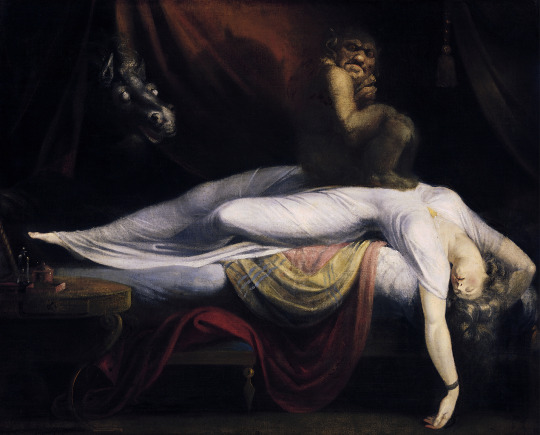
John Henry Fuseli - The Nightmare (1781)
Music of the 1760s-1790s, corresponding with the first wave of “Gothic Novels” in the English language. Some names in this era include Horace Walpole (The Castle of Otranto), Ann Radcliffe (The Mysteries of Udolpho, The Italian) and Charles Brockden Brown (Wieland). The closest we have to music of this same era would be in the Sturm und Drang style. Sturm und Drang (Storm and Stress) was used to describe music written in a minor key that was restless, agitated, intense, emotional, and more extreme than the typical expectations for restraint and lightness/clarity, music that aristocrats in powdered wigs and velvet and lace could relax with. Strong changes of emotion and more emphasis on subjectivity, reflected by sudden modulations and pulsing rhythms.
The most famous piece that I associate with Sturm und Drang is Wolfgang Amadeus Mozart’s “little” g minor Symphony no.25, K.183 (1773). It is famously used in the opening of Miloš Forman’s Amadeus (1984). It is a fun piece, and that opening movement is full of fire, and probably the young Mozart having fun (he wrote it at 17. If you ever want to lower your self esteem, look up what music Mozart wrote at your current age.). Another major work would be Joseph Haydn’s “Farewell” Symphony no.45 (1772), written in the very unusual for the time key of f# minor. And of course, even though he comes later, anything Ludwig van Beethoven published in a minor key has a lot of muscular passion to it, and his early/classical era of the 1790s is no joke. Check out the final movements of his Piano Trio no.3 in c minor and his Piano Sonata no.1 in f minor, or his most famous early sonata, the Pathetique.
But if the Sturm und Drang style and Gothic genre also emphasize the disturbed and the psychological, we can include programmatic works that do the same. Mozart’s opera Don Giovanni (1788) has an incredible moment in the finale. The sociopathic hedonist is confronted by the ghost of the man he murdered in the first act, who possesses a statue and confronts Don Giovanni with his sins. Don Giovanni doesn’t repent, so he is dragged into hell with a chorus of demons. Always a good reminder that Mozart wasn’t the eternal child who wrote pretty melodies.
19th Century

Caspar David Friedrich - The Abbey in the Oakwood (1810)
Music of the early 19th century corresponds better with Gothic fiction because Romanticism in art brought greater interest in the supernatural, in the subjective, in emotional reactions to the universe… major names in fiction include the poetry of Lord Byron (Darkness), Mary Shelley (Frankenstein, The Last Man), and Sir Walter Scott (The Bride of Lammermoor). Greater emphasis is put on the anxiety of the unknown, supernatural fears beyond our control.
Of all Franz Schubert’s songs, Erlkönig (1815) best exemplifies the Gothic (and this is a bold claim because I only know about a fraction of Schubert’s extensive song output). In it, a father and son are riding on horseback. The son is sick with fever. As they ride, the son cries out that he can hear the Elf King calling out to him, some evil spirit or demon that wants to take the son’s life. The father tries to calm him down, but the Elf King gets closer and closer. By the time they reach home, the son has died. Was the Elf King real? Was the son hallucinating from fever? How literal should we take this text? The ambiguity of subjective experiences and how we interpret and understand reality is a major theme in Gothic fiction.
Many famous German operas lean into the supernatural and magical. In this period we get Carl Maria von Weber’s Der Freischütz (1821), considered to be the first Romantic opera. In it, our main character Max who needs to win a shooting contest so he can be allowed to marry his lover, Agathe. He is given a gun that can shoot magic bullets by another forrester Kaspar (who has his own plans). Kaspar tells Max to meet him in the “Wolf’s Glenn” in the woods at midnight for more magic bullets. In the Wolf’s Glenn, Kaspar calls for a spirit, the Black Huntsman Samiel, to help him curse the other characters, offering Max’s soul in exchange. Making deals with demons/the devil was another fascination in Romanticism.
Legends of a diabolical nature were springing around great musicians. At the end of the 1700s, Giuseppe Tartini wrote his most famous composition, the “Devil’s Trill” Violin Sonata in g minor which is full of virtuosic passages. Tartini claimed that the Devil appeared to him in a dream, and that he sold his soul in exchange for the Devil to be his servant. He handed the Devil his violin, and the Devil “…played with such great art and intelligence, as I had never even conceived in my boldest flights of fantasy. I felt enraptured, transported, enchanted: my breath failed me, and I awoke” Source
Similar stories came about with violinist Niccolò Paganini, who astonished the audiences of the early 19th century with his (for the time) otherworldly technique, dazzling them with scales and leaps and scratches the likes of which you can hear across his 24 Caprices for solo violin. A young Franz Liszt was at one of Paganini’s concerts and he was enthralled and inspired to become the “Paganini of the Piano”. He too would dazzle audiences with his percussive intensity, glittering arpeggios, and dreamy modulations to possess women with the spirits of hysteria and other dated misogynistic diseases. Cliche to say but before Bieber Fever, before Beatlemania, there was Lisztomania.
The sense of Faustian bargains comes through in the pieces Liszt wrote after Goethe’s Faust. The Faust Symphony (1857) includes a movement for Mephistopheles, the demon/ the Devil that bargains with Faust. The Mephistopheles movement has no original theme, but takes and corrupts the themes of Faust and his lover Gretchen into a mocking tone. Later on, Liszt was inspired to write a tone poem “The Dance in the Village Inn” or Mephisto Waltz no.1 (c.1862). He also wrote it for piano around the same time. The story has Mephistopheles taking Faust to a wedding in a village and playing the violin so madly, the partygoers are intoxicated by the music and go off dancing in the woods. Emotions taking over and making one act irrationally was another fascination in Gothic fiction.
Liszt would go on in his later years writing a few more Mephisto waltzes, with a lot of forward thinking harmonies and piano writing, unfortunately not as popular. Mephisto waltz no.2 (1881) has moments that make me think of Debussy, and the third (1883) has glittering and ethereal moments. But the best example of Liszt’s interest in the Gothic would be his earlier concert piece Totentanz (1949), or Dance of Death (Danse macabre). In it, the piano and orchestra play out variations on the Medieval chant Dies Irae, always reminding us of the inevitability of death. The variations depict skeletons dancing wildly all while the Mephistopheles at the piano unleashes his seductive tones.
The Dies Irae chant goes across our pop culture, with one famous iteration being a synthesized version of passages from Hector Berlioz’s Symphonie fantastique that Wendy Carlos wrote for Stanley Kubrick’s The Shining (1980) after Stephen King’s novel of the same name. And it was Berlioz’s symphony that enchanted audiences in 1830 with new, titanic sounds beyond what orchestra music had been before. In the story of the Symphonie fantastique, an artist has tried to overdose on opium after feeling rejected by unrequited love, but instead he has a vivid drug induced nightmare where he is sentenced to be beheaded via guillotine, which was still a traumatic living memory for the Parisian audience. He then sees himself among ghosts and monsters during a witches’ sabbath, the lovely woman’s beautiful theme is distorted into a grotesque mockery, the Dies Irae comes back among the cackling. It was a new degree of imagination expected from the audience. Later, Berlioz would depict demons in Pandæmonium (the Capital of Hell in Dante’s Inferno) at the end of his Damnation of Faust.
Through the mid to late 19th century we get authors of Gothic literature such as Edgar Allan Poe, Elizabeth Gaskell, Emily and Charlotte Brontë, Nathaniel Hawethorne, and Victor Hugo. We also get two more operas that have Gothic themes. First is Richard Wagner’s The Flying Dutchman (1843). In this opera, a ship on the North Sea collides with the Ghost Ship of the Flying Dutchman who is cursed to sail the seas forever, but is allowed to come ashore once every seven years and if he can find a wife, he will be freed. I’m sure you can guess how this opera ends. The overture is often played in concert for a condensed version of Wagnarian thunder and romance. The next important opera is Giuseppe Verdi’s Macbeth (1847), because Shakespeare was being revived and translated in different languages across Europe and Verdi loved his plays. In the opera, Macbeth comes across a chorus of witches that foretell his success and downfall. He is too ambitious and goaded by Lady Macbeth, plans to take the throne through deception and murder. Lady Macbeth is later haunted with phantom blood on her hands which only she can see. And Macbeth succumbs to his inevitable fate.
We also get two significantly “Gothic” pieces of orchestra music. They are both tone poems, which also reflects the concert goers’ tastes. The one that has always been a quintessential “Halloween classical” piece is Camille Saint-Saens’ Danse Macabre (1875), opening at the stroke of midnight (softly evoked by the harp), a violin shrieks out the tritone (the “Devil’s interval” which the Romantics thought meant was cursed by the superstitious Medievals, really it was an idiom for “hard to use in music”) and introduces ballroom music along with the clacking bones of skeletons dancing in the graveyard (evoked by the xylophone). The skeletons dance through the night until the rooster crows at dawn.
The other great Halloween concert piece is Modest Mussorgsky’s Night on Bald Mountain (1867) which depicts another witches sabbath, this time on St. John’s Night, a major holiday in Slavic Eastern Orthodox culture. Walt Disney’s Fantasia (1940) would help bring this poem to life with an animated phantasmagoria of ghouls and skeletal horses and other demons flying around the mountainous demon Chernoberg.
[Here I want to give a quick shoutout to Cesar Franck’s Le Chasseur maudit (The Accursed Huntsman), a tone poem about a Count who doesn’t go to church one Sunday, and instead rides around to whip peasants for his own amusement, so demons drag him to hell. Not nearly as famous a concert piece as the others mentioned in this list but it has colorful orchestration so you should check it out.]
The initial idea for Fantasia was for Disney to repopularize Mickey Mouse by writing him into an animated version of Paul Dukas’ The Sorcerer’s Apprentice. The original poem by Goethe was a classic that Paul Dukas set to music in 1897. In it, we hear the Sorcerer leave his Apprentice to clean the floors of his workshop. The Apprentice uses magic to bring a broom to life so it can do the chores for him. The Broom mindlessly pours buckets of water all over the floor, and the Apprentice isn’t good enough with magic to stop it. He chops it up into pieces with an ax, but they regenerate into several brooms which go back to marching water in. The Sorcerer returns to clean the mess and scolds his Apprentice. This charming tale has a darker and more diabolically fun tone in Dukas orchestra.
20th Century
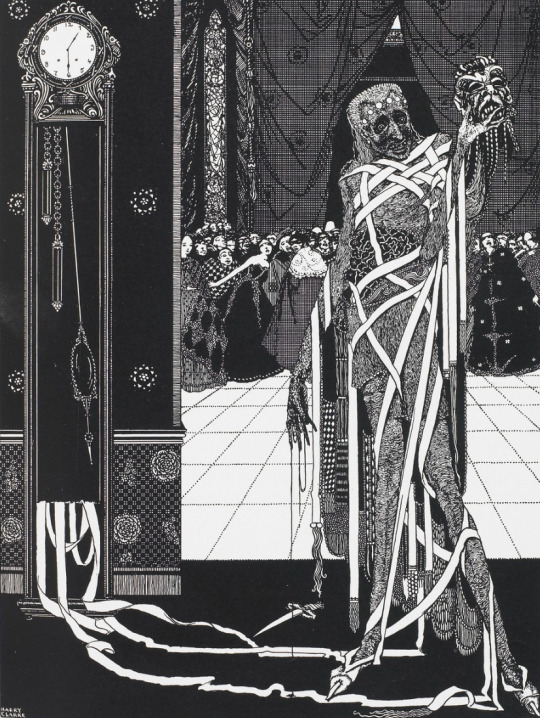
Harry Clarke - Illustration for "Masque of the Red Death" (1919)
In the same exact year of Dukas’ tone poem, we get Bram Stoker’s Dracula. At this turn of the century other major names include Gaston Luroux (The Phantom of the Opera), Robert Lewis Stevenson (Dr. Jekyll and Mr. Hyde), Henry James (The Turn of the Screw), Oscar Wilde (The Picture of Dorian Gray). At this time, there are a few more pieces that continue trying to evoke Gothic subject matter. One comes from Gustav Mahler’s Symphony no.7 (1905), sometimes dubbed “Song of the Night”. Two of the symphonies five movements are titled “Nachtmusik” (night music), the first is more in line with Gothic anxiety and spookiness than the second which is more like a serenade. But the most Gothic movement is the Scherzo which sits in the middle of the symphony and is like a Viennese ballroom full of dancing corpses and skeletons as waltz music decays with them.
A surprising example (at least, because of how relatively obscure it is) comes from Claude Debussy with parts of an opera based on Poe’s The Fall of the House of Usher that he worked on between 1908-1917. Not too much a surprise on the one hand because French translations of Poe’s work became popular and influential. On the other hand Debussy is more known for evocative sound pictures, unique musical colors, and subtlety. Perhaps he was drawn to symbolist and psychosexual interpretations of The House of Usher, the same interests that preoccupied him with his only finished opera Pelleas et Melisande. Roger Orledge reconstructed the opera and tried to stay true to Debussy’s style, so what we do have is passable and as shadowy and vague as his other orchestral masterpieces.
Maybe the hardest work to recommend (but I do recommend regardless, give it a chance) is a Modernist song cycle for chamber ensemble. Arnold Schoenberg’s Pierrot Lunaire (1910) uses freely chromatic atonality to give a demented color of psychosis experienced by Pierrot, personified version of a stock character for old Commedia dell Arte plays, a clown who over time became the “sad clown”. Maybe a precursor to the demon from Stephen King’s It, or the demented clowns and jesters that laugh at the madness of the cosmos across Thomas Ligotti’s short stories.
This was only meant to be a small overview of works that could fit my own view of the Gothic in music. There are more examples I could include, so as a hint toward today, I’ll end with a piece that was written about a century ago, yet sounds as if it could have been written today. Henry Cowell’s The Banshee (1925) is a short piano piece, so if you can, at least listen to this one. Instead of playing with the keys like you’re “supposed to”, Cowell asks the performer to drag their fingers along the wires directly. This creates disturbing reverberations and scratching sounds that tingle the back of your neck, that feel like the otherworldly cry of a Banshee.
Happy Halloween.
#classical music#Halloween classical#Halloween#Halloween music#Mozart#Haydn#Beethoven#Schubert#Liszt#Paganini#Berlioz#Saint-Saens#Mussorgsky#Wagner#Verdi#Dukas#Mahler#Debussy#Schoenberg#Cowell#Wolfgang Amadeus Mozart#Josef Haydn#Ludwig van Beethoven#Franz Schubert#Niccolo Paganini#Franz Liszt#Hector Berlioz#Camille Saint-Saens#Cesar Franck#Franck
82 notes
·
View notes
Text
my kin list in order from "virgin nerd" to 'FUCKING SLUT'
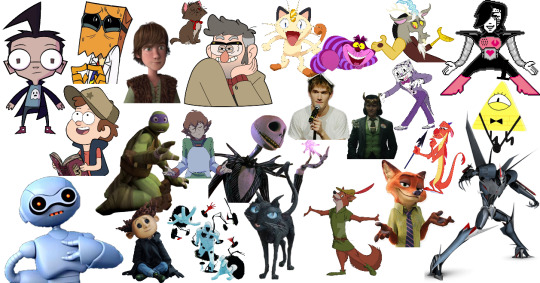
#dib membrane#fugitoid#dipper pines#donatello hamato#hiccup haddock#wybie lovat#berlioz#stanford pines#voltron pidge#the spot#jack skellington#coraline cat#meowth#bo burnham#cheshire cat#robin hood#loki odinson#mlp discord#king dice#nick wilde#mushu the dragon#mettaton#undertale mettaton#bill cipher#starscream#starscream tfp#tfp starscream#tfp
121 notes
·
View notes
Text
It's BOOp Time!! (again)

89 notes
·
View notes
Text


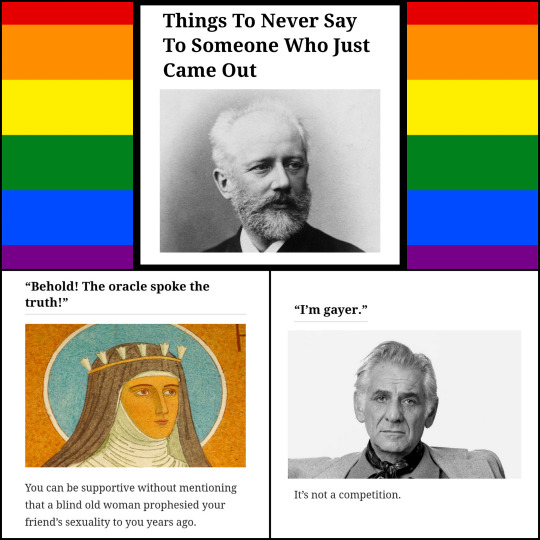


Things To Never Say To Someone Who Just Came Out - Composers Edition!
#tchaikovsky#hildegard von bingen#bernstein#brahms#britten#haydn#prokofiev#ravel#rachmaninoff#robert schumann#clara schumann#messiaen#chopin#mozart#stravinsky#debussy#lully#berlioz#wagner#charles ives#classical music#classical music memes#music memes#composer memes#lgbt#gay#lgbt history#gay history#the onion
514 notes
·
View notes
Text
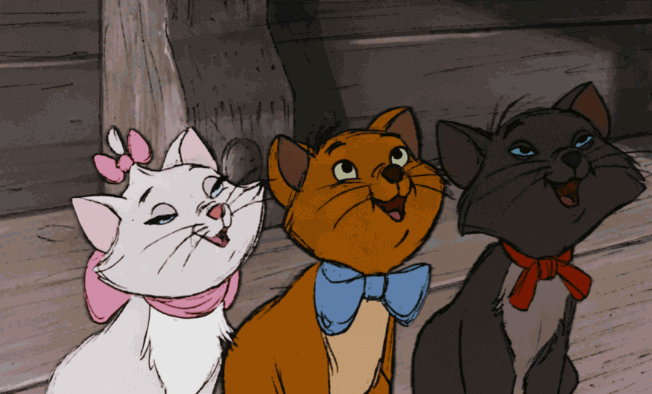


Toulouse, Berlioz, and Marie just being the cutest Disney siblings ever
🎹🎨🌷
#disneynerdpumpkin#disney#the aristocats#aristocats#classic disney#marie aristocats#marie#berlioz#toulouse#this is also my 100th post! thank you so much to all of my followers who got me here#this is a small blog that i just do for fun and i didn't expect to have a lot of followers or anything much less any mutuals#but i'm glad that ppl like my posts and my blog even though there's really nothing that special about it#just fangirling over things and posting bible verses and christian content#so having my followers and mutuals keeps me going to keep posting more for everyone!#disney siblings#tysm to all of my followers#i love the aristocats#i love marie berlioz and toulouse sm they're so cute#i cant even
189 notes
·
View notes
Text
Better than fan fiction: Franz being Franz again, Chopin has to listen to "I can't control my libido" over and over again, while Marie D'Agoult is jealous of...Chopin.
And Berlioz sits next to Franz and cries, while he was writing this letter...
I'm beginning to realise why all of this has become too much for you, @chopinski-official , really. 🙈

46 notes
·
View notes
Text
you are a sculptor in Rome who has been commissioned to make a sculpture for the Pope. the Pope, annoyed that you have not finished said sculpture, sends you an advance payment along with a heavy guilt-trip that involves you promising to have said sculpture finished tomorrow.
#opera tag#opera#benvenuto cellini#berlioz#hector berlioz#trying something here bc i think it would be funny pls indulge me
42 notes
·
View notes
Text
I have two new Jewish headcanons. These classic Disney characters are Jewish:
Duchess and her kittens from The Aristocats...

...and Miss Bianca from The Rescuers and The Rescuers Down Under.

I was today years old when I learned that Duchess and Bianca's voice actress Eva Gabor was Jewish. But from now on, I'll imagine that the same is true for the characters. A French Jewish cat – and kittens –and a Hungarian Jewish mouse.
I'd love to read fics showing them sharing Jewish culture and traditions with O'Malley and Bernard, respectively. Whether O'Malley and Bernard would convert or they would have interfaith homes I don't know. (O'Malley I don't see practicing any religion to begin with, but Bernard I can picture having had a Christian upbringing.) But either way, it would be nice to see explored in fanfic.
@ariel-seagull-wings, @themousefromfantasyland
#disney#jewish#judaism#headcanon#jewish headcanons#the aristocats#duchess#berlioz#the rescuers#the rescuers down under#miss bianca#eva gabor
39 notes
·
View notes
Text
The symphony bracket is here!
This is how voting will proceed:
Beginning on September 1, one poll (2 symphonies) will be posted per day. The poll duration will be 7 days.
The reason for the slow posting will be to give voters time to listen, in case one or both symphonies is new to them!
There are 64 symphonies in the bracket, meaning 32 polls.
Happy voting!



Left Side:
Mahler 2 vs Prokofiev 5
Bruckner 8 vs Mozart 10
Mahler 10 vs Schubert 8
Pejačević 1 vs Beethoven 9
Shostakovich 7 vs Glière 3
Beethoven 5 vs Tchaikovsky 6
Mahler 1 vs Sibelius 2
Beethoven 8 vs Vaughan Williams 2
Copland 3 vs Beach Gaelic
Beethoven 6 vs Dvořák 7
Borodin 2 vs Saint-Saëns 3
Mendelssohn 4 vs Beethoven 3
Rachmaninoff 2 vs Kalinnikov 2
Prokofiev 1 vs Rachmaninoff 1
Emilie Mayer 2 vs Vaughan Williams 7
Haydn 75 vs Dvořák 8
Right Side:
Mahler 5 vs Polymath 1
Corigliano 1 vs Ives Universe
Price 1 vs Shostakovich 5
Mahler 6 vs Sibelius 5
Prokofiev 7 vs Mendelssohn 5
Shostakovich 11 vs Mahler 3
Shostakovich 9 vs Ives 4
Berlioz Symphony Fantastique vs Britten Simple Symphony
Vaughan Williams 1 vs Tchaikovsky 4
Shostakovich 10 vs Hovhaness 4
Beethoven 7 vs Grant Still 2
Dvořák 9 vs Brahms 1
Brahms 2 vs Maslanka 4
Brahms 3 vs Tchaikovsky 1
Tchaikovsky 5 vs Mozart 40
#if you notice a symphony is not on here that you expected to be that's bc it was submitted after the 64th one#let me know if you find a mistake :) i checked about three thousand times for spelling errors/doubles etc but i am human#mahler#sibelius#mendelssohn#beethoven#shostakovih#berlioz#florence beatrice price#hovhaness#bruckner#liszt#aaron copland#classical music#corigliano#borodin#tchaikovsky#tumblr bracket#poll bracket#tournament poll#long post
185 notes
·
View notes
Text


It's time for the Nightmare Ball.
90 notes
·
View notes
Text

Life is great for Duchess with her kittens and Madame Adelaide Bonfamille. What's a will?
#cat#aristocats#berlioz#bow#cats#collage#cute#cutecats#disney#disneyland#disneyprincess#disneyworld#duchess#kittens#lionking#marie#thearistocats#toystory#whitecat#aristochats#disneylandparis#disneylove#disneypins#disneystore#thomasomalley#disneyfan#disneycats#aristocatsmarie#mariearistocats#disneylife
15 notes
·
View notes
Text

So ever since Once Upon a Studio came out (outstanding short btw), I've been thinking of even more fun ways characters from different movies could interact with each other and this is an idea my sister had: Dodger covered in kittens from other movies while Rita stares lovingly at how adorable it is.
Of course an idea like that needed to be drawn.
#fan art#disney#oliver and company#dodger#rita#oliver#the aristocats#marie#toulouse#berlioz#alice in wonderland#dinah#pinocchio#figaro
99 notes
·
View notes
Text

.the aristocats / berlioz, marie & toulouse
and here are the three siblings together <3
97 notes
·
View notes
Note
Current favourite music ?
just will share my fave playlists & artists!**all on apple music

artists:
david bowie; the beatles;queen; bob dylan; jeff buckley; the smiths; radiohead; the doors; the neighborhood; arctic monkeys; cigarettes after sx; u2; berlioz; monty alexander;lana del rey(😭)
playlists(created by me):
the man who fell to earth (david bowie!)
613(the beatles)
elizabeth grant(aka lana del rey)
& all that jazz and pasta(jazz)
glimpse of joy(Hz, meditative music(?))
passionée(love love love)
the sky is blue like me & you (honestly, just sad playlist to let my emotions out)
lumière douce du dimanche matin(that itches something in my brain)
#david bowie#the beatles#queen band#bob dylan#jeff buckley#the smiths#radiohead#the doors#the neighbourhood#arctic monkeys#cigarettes after sex#u2#berlioz#monty alexander#lana del ray aka lizzy grant#lana del rey#favorite music#music recs#music recommendation#n1pp
16 notes
·
View notes